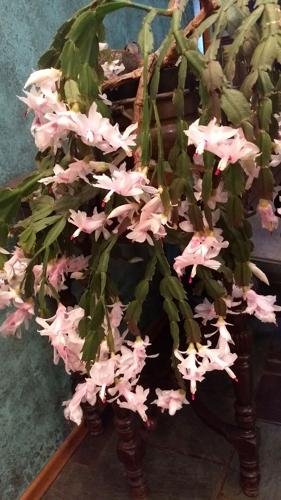Gifting a plant for Christmas? Give it some thought, first
By Bonnie Orr
WSU Chelan/Douglas County Master Gardener


Given that December is the darkest time of the year with a little more than eight hours of sunlight, who cannot appreciate the delight of flowering plants? It is satisfying to give and to receive plants this month, but sometimes cut flowers are a wise choice.
Not all plants are equally welcome because they can cause problems.
First, leafy, flowering plants were grown in a greenhouse or in a part of the world that has many more hours of sunlight. It is difficult to mimic that quality of light in your home, so the gift plant’s leaves fade to yellow and began to fall off. Don’t do this to your friends; it will make them feel insecure about nurturing houseplants such as miniature roses or cyclamen.
A second problem with gift plants is that they may harbor pests such as scales, aphids, whitefly or red spider mite. These little critters most likely will infest your other houseplants, and winter will be long and tedious as you attempt to control the insect pests on all of your plants. Most houseplants are tropical plants that thrive in humidity. Our climate is dry, and our heated houses are even dryer, with about 28% humidity. Gift plants often develop brown edges on their leaves because of the dry air.
Orchids are a temptation, but really they should be treated as cut flowers that last for three months and then tossed out. Anemic, straggly orchids are decidedly unattractive.
The safest plant gifts are the old standbys such as bulbs, poinsettias or Christmas cactus. These plants are generally healthy but need to be observed regularly.
Bulbs, such as amaryllis, are dormant when they are gifted, and the recipient has the pleasure of watching the daily growth that culminates in fabulous lily flowers. If the leaves start to yellow, look for pests and be prepared to toss the entire plant, the pot and the soil in the trash.
Poinsettias are fine for a few weeks. If they get chilled or overwatered, they drop the red bracts and green leaves, at which point, they, too, should be tossed out. There is nothing worse looking than a skeletonized poinsettia.
Schlumbergera, such as Thanksgiving or Christmas cactus, are nearly foolproof. The Thanksgiving plant has little “horns” on the edges of the petiole, and the Christmas cactus has smooth leaves or petioles. They do not get insect pests and the greatest problem is overwatering, which causes the flower buds to fall off or the entire plant rots from the base. Many times, these plants bloom more than once a year and they can live long enough to be passed down as heirlooms.
Whatever plants you choose to give as a gift, remember that these all are tropical or subtropical plants. Have the store clerk wrap the entire plant in a large bag. Make sure your car is warm and drive as close to the store doors as possible to retrieve the plant. Twenty seconds of cold air (less than 50 degrees) will kill or maim your gift.
Well, when all things are considered, perhaps a quality garden tool is an ideal gift for a gardener friend!
